Trump impeachment trial No. 2 ended with acquittal. But federal, state, and local investigations continue into his presidency, campaign, business interests, and taxes.
When President Donald Trump on Saturday begged Georgia Secretary of State Brad Raffensperger to "find" additional votes in that state's presidential contest, he exposed himself to new legal peril, several election lawyers and experts tell Insider.
Trump's latest gambit to overturn the results of a presidential election he lost will almost certainly add to an already unprecedentedly large docket of lawsuits and investigation awaiting him after he leaves the White House on January 20.
The outgoing president could face criminal and civil matters at the federal, state, and local levels. Trump's administration, campaign committee, and business interests, as well as Trump himself, are all targets.
And in the final days of his term, the question remains: Will a pardon-happy Trump attempt to preemptively pardon himself before he faces any criminal charges, something many legal scholars consider patently illegal? Or, more exotically, might Trump even resign his office so that President Mike Pence could pardon him?
Here's a look at the specific — and numerous — legal dramas that could haunt Trump for years to come:
Georgia vote call fallout
Trump's ever-flailing quest to remain president despite losing a free, fair, and states-certified election hit its apex of inexplicably Friday. During an hourlong phone call, Trump asked Raffensperger, a fellow Republican, to "find" 11,780 votes in Georgia — a state that Trump lost by roughly that many votes.
Numerous congressional Democrats are already calling for federal criminal investigations.
"This recording makes Nixon's 'smoking gun' tape sound tame," said Rep. Don Beyer, a Virginia Democrat.
"There were just a number of statements Donald Trump made that fit the definition of attempting to engage in election fraud," added Democratic Rep. Ted Lieu of California.
Trump could face trouble at the state level, too.
Georgia law considers "conspiracy to commit election fraud" a crime punishable as a misdemeanor or felony, depending on the nature of the offense.
There's also a Georgia law against the "criminal solicitation to commit election fraud," which occurs when someone "solicits, requests, commands, importunes, or otherwise attempts to cause the other person to engage" in election fraud.
The Georgia state attorney general's office, as well as District Attorney Fani Willis in Fulton County, the Atlanta-based center of Peach State government, have the power to investigate Trump or his associates on the call.
Whether they do so is another matter: Georgia Attorney General Chris Carr is a Republican who already has attracted Trump's ire, and a county district attorney's office may not have the resources to engage in a protracted and politically charged legal battle, several Georgia election law attorneys tell Insider.
Trump's actions on his phone call with Raffensperger are "brazen criminality taking place in broad daylight" said Marc Hershovitz, an Atlanta-based political law attorney. "The president of the United States committed multiple felonies … what Richard Nixon did pales in comparison to what we see now."
It's "quite clear" under Georgia law that intentionally soliciting, requesting, or commanding someone to violate the Georgia election code is itself a crime, said Kurt Kastorf, a former Justice Department trial attorney who now practices privately in Georgia and Washington, DC.
What's complicated, he added, is determining and proving that Trump intended to commit a crime.
"I would expect that the administration will respond to these leaked tapes by asserting that they have evidence of irregularities in the vote and were simply imploring the Secretary of State to ensure a fair election," Kastorf said. "Whether this argument is a sincere one is tough to discern."
Trump's behavior on the Georgia call is "beyond inappropriate," "not right and proper," and came "mighty close" to violating Georgia state law, said Bryan Sells, an election law attorney also based in Atlanta.
But Sells questioned whether Trump's actions rise to the level of being criminal actions, given that, in his estimation, Trump didn't clearly coerce Raffensperger into breaking a specific state law.
"I would be surprised if Georgia investigates this," he said.
Jake Evans, an election law attorney at Holland & Knight and chairman of the Georgia Government Transparency & Campaign Finance Commission, said he wouldn't address the substance of Trump's call unless his commission formally reviewed it.
"At which point I would consider and comment on the matter at the public meeting that the issue [was] considered at," he said.
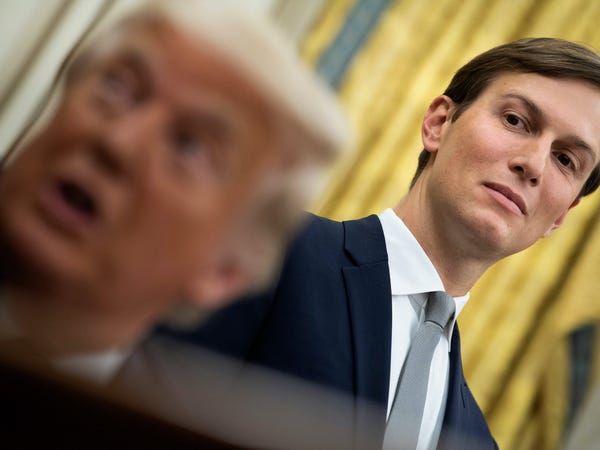 Three Democratic members of Congress have asked for federal investigations into a secretive shell company connected to Trump's 2020 campaign created in part by Jared Kushner.
Three Democratic members of Congress have asked for federal investigations into a secretive shell company connected to Trump's 2020 campaign created in part by Jared Kushner. Cracking a Trump campaign shell company
At the heart of Trump's failed 2020 re-election campaign is a secretive shell company, American Made Media Consultants.
Insider revealed in December that Trump son-in-law Jared Kushner, as well as a deputy of Trump's son Eric Trump, helped create the shell company, through which the campaign hid the true sources of political payments — including Trump family members.
Three Democratic members of Congress, in two separate requests filed during late December, have asked the Department of Justice and Federal Election Commission to investigate whether it violated election laws.
In a timely, and potentially troubling twist for Trump: the National Defense Authorization Act included a provision that bans anonymous shell companies established in the United States. Trump vetoed the act, but Congress — for the first time in the Republican's four-year term — voted on January 1 to override the president.
The true owners of such companies must now reveal themselves to the Department of the Treasury, although not the general public. Come January 20, the Treasury Department is part of then-President Joe Biden's administration.
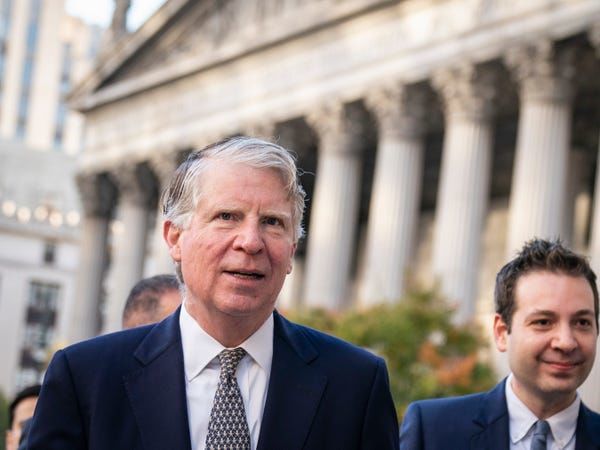 Cyrus Vance (left), the district attorney of Manhattan, appears to be criminally investigating whether Donald Trump and his namesake company engaged in bank and insurance fraud.
Cyrus Vance (left), the district attorney of Manhattan, appears to be criminally investigating whether Donald Trump and his namesake company engaged in bank and insurance fraud. Attack of New York state
Presidential pardons don't apply to state-level legal actions. Nor does Biden's potential reluctance for the federal government to aggressively pursue questions of Trump wrongdoing.
New York state, therefore, could play a leading role in the legal pursuit of a post-presidency Trump. No doubt, officials in the Empire State are already deep into digging in and around Trump's orbit.
New York Attorney General Letitia James, for one, is civilly investigating whether the Trump Organization illegally inflated the value of its assets in a bid to score tax breaks.
District Attorney of Manhattan Cyrus Vance, in a separate matter, appears to be criminally investigating whether Trump and the Trump Organization engaged in bank and insurance fraud.
It's a fight Vance is now waging before the Supreme Court, where the justices are still deliberating over a request from the president's lawyers to quash a subpoena for financial documents held by Trump's longtime accounting firm.
"The New York authorities will stop at nothing to go after him," attorney Alan Dershowitz, who represented Trump during his 2020 Senate impeachment trial, recently told Insider. "It's all political. They don't like Trump. Even though I don't think there's any 'there there," it'll be very easy for them to comb the statue books and try to find something."
Presidential pardon brouhaha
The US Department of Justice is already probing an alleged "bribery conspiracy scheme" related to Trump's presidential pardons, according to federal court documents unsealed in early December.
Trump has denied wrongdoing, and the Justice Department said in a statement to Insider in December that "no government official was or is currently a subject or target of the investigation disclosed in this filing."
That all came before Trump in late December issued a wave of high-profile pardons, including to political allies, Mueller investigation subjects, and people close to the Trump family. The US Constitution grants presidents unfettered power to issue pardons as they see fit.
What's not known: what would happen if Trump attempts to pardon himself. Many constitutional scholars have argued that such an action wouldn't legally stand, and Hershovitz says a Trump self-pardon would almost certainly trigger a monumental legal challenge.
"If not, every president could go on a crime spree during their term and then just grant themselves a self-pardon," he said.
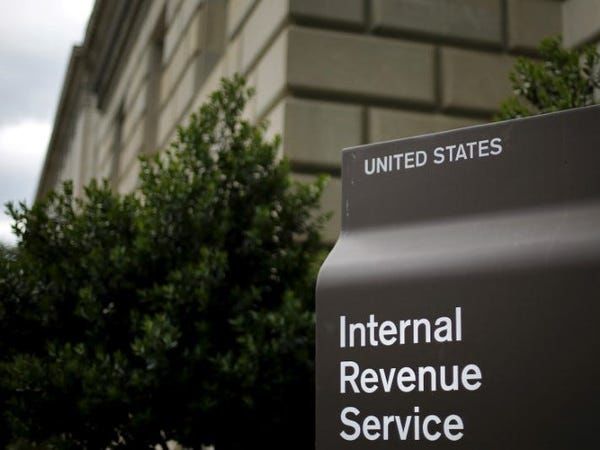 President Trump has refused to release his tax returns because of an ongoing IRS audit.
President Trump has refused to release his tax returns because of an ongoing IRS audit. Tax man's revenge?
For years, Trump has refused to voluntarily release his federal tax returns, citing an ongoing audit by the Internal Revenue Service — even though an audit doesn't preclude Trump from making such information public.
Trump tax return data obtained by the New York Times indicates Trump paid little or no federal income tax during 11 of the 18 years for which it had information. Trump also used creative methods to reduce his tax bills and score refunds — a reason why the IRS is auditing his taxes in the first place.
The Treasury Department under Biden could also give investigators in the Democratic-led US House Trump's tax returns. Lawmakers have spent several years attempting to obtain them, to no avail, through the courts.
Such a move, however, could undercut Biden's desire to move beyond Trump's term in office and focus on his own agenda.
Mueller investigation hangover
The 448-page Mueller report, which focused on Russian influence during the 2016 election, detailed evidence that Trump repeatedly attempted to obstruct justice.
In his testimony before Congress in July 2019, the former special counsel confirmed that his team's work could indeed be the basis for future prosecutions against Trump. But that only can come once Trump's immunity from federal indictments goes away when he's out of office.
Emoluments: still afloat
The attorneys general of the District of Columbia and Maryland argue in a still-pending federal lawsuit that Trump violated the Constitution's emoluments clause by making money off foreign officials who stay at the Trump International Hotel in Washington.
In October, the US Supreme Court declined to entertain a similar lawsuit brought by Democratic members of Congress, thereby allowing a lower court ruling dismissing the lawsuit to stand.
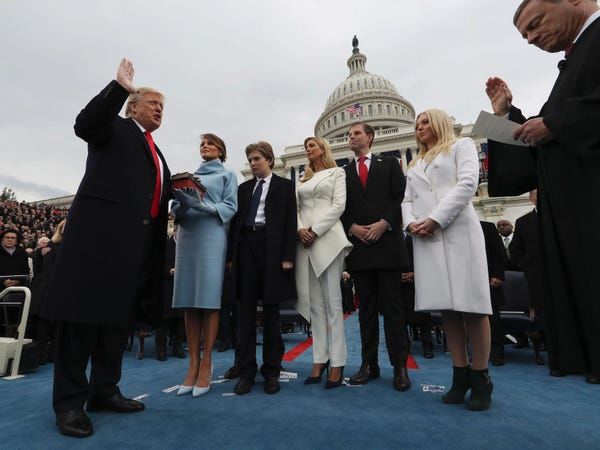 President Trump's 2017 inauguration remains the subject of a Washington DC lawsuit and of interest to federal prosecutors.
President Trump's 2017 inauguration remains the subject of a Washington DC lawsuit and of interest to federal prosecutors. A never-ending Trump inauguration
In early 2020, Attorney General Karl Racine of Washington, DC, filed a lawsuit against Trump's 2017 inauguration organizing committee.
The suit, which is pending in DC Superior Court, alleges that Trump used nonprofit money to enrich his family business.
Federal prosecutors from the Southern District of New York are also investigating spending by Trump's inauguration committee, which is organized as a nonprofit corporation.
Stormy Daniels, Michael Cohen, and "Individual-1"
The Southern District of New York named the president as "Individual-1" in 2018 court filings when they charged Trump's former lawyer, Michael Cohen, with making illegal hush money payments out of campaign contributions to two women who claimed to have had affairs with Trump.
The government's investigation has since ended related to Cohen's campaign finance violations, according to a federal judge's July 2019 order.
But SDNY officials aren't done with the president. Federal prosecutors have also been investigating Trump personal attorney Rudy Giuliani and two associates who were involved in a pressure campaign to get the Ukrainian government to launch an investigation into Biden and his son, Hunter — the same effort that prompted the president's impeachment in the House.
The two associates, Lev Parnas and Igor Fruman, are scheduled to go on trial in March on charges they used a shell company to make an illegal $325,000 donation to a committee backing Trump's 2020 campaign. Both men have pleaded not guilty in their case, which has been delayed for months due to the coronavirus pandemic.
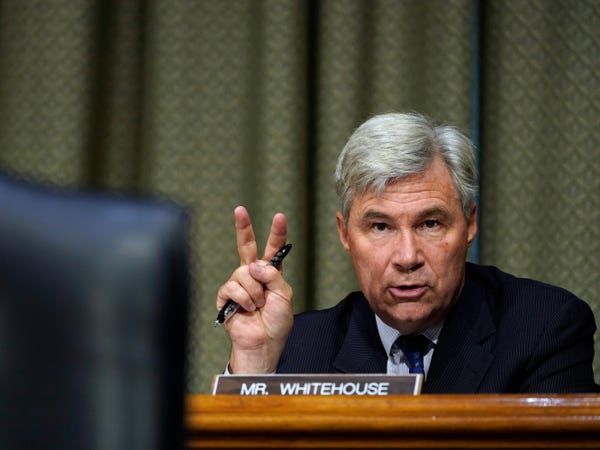 Sen. Sheldon Whitehouse, a Democrat from Rhode Island, is among members of Congress who want to investigate President Donald Trump's actions after he leaves the White House.
Sen. Sheldon Whitehouse, a Democrat from Rhode Island, is among members of Congress who want to investigate President Donald Trump's actions after he leaves the White House. Truth commission cometh?
Several congressional Democrats told Insider last year they'd like to create a bipartisan, Congress-backed "truth commission" to investigate and publicly disclose findings about Trump's four years as president.
Democratic Sen. Sheldon Whitehouse of Rhode Island, a former federal prosecutor and state attorney general, endorsed a similar idea — a special congressional committee — to start in 2021.
"A special committee provides a single repository for evidence and testimony, and could without hindrance investigate schemes that crossed agency and committee jurisdictions," Whitehouse wrote in Salon.
Among potential issues such a commission might investigate: Trump administration's COVID-19 response, the separation of immigrant children from their parents, and the unprecedented blurring of lines blurring of lines among a sitting president's governmental, political, and business interests.
Congress has charted such commissions before. The 9/11-related National Commission on Terrorist Attacks Upon the United States and National Commission on the BP Deepwater Horizon Oil Spill and Offshore Drilling are the most notable of the past 20 years.
But some congressional Democrats may be concerned that such a commission would end up becoming political theater and overshadow or detract from Biden administration efforts around a slate of issues from the economy to health care, and the federal government's pandemic response.















